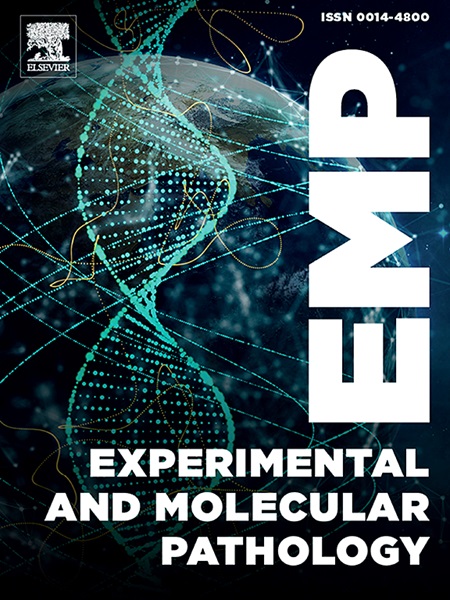从石棉暴露到癌变:恶性胸膜间皮瘤的转录组特征
IF 3.7
4区 医学
Q2 PATHOLOGY
引用次数: 0
摘要
背景:恶性胸膜间皮瘤(MPM)的发病率由于广泛接触石棉而激增,特别是自20世纪中期以来。尽管癌症治疗取得了重大进展,但MPM的有效治疗仍然难以捉摸,这主要是由于对石棉相关致癌的分子机制的了解有限。本探索性研究旨在揭示记录石棉暴露的间皮瘤患者的基因表达模式的独特改变,为未来的研究提供坚实的基础,重点是确定新的预后和预测性生物标志物。方法通过生物信息学管道分析公开的RNA测序数据,进行差异基因表达分析。此外,功能富集分析应用于突出与生物过程、分子功能和细胞成分相关的显著富集的基因本体(GO)术语,为MPM发展中涉及的分子途径提供了见解。结果该分析揭示了记录石棉暴露的MPM患者的一组差异表达基因(DEGs),以及关键的GO术语。这些丰富的生物学术语反映了离子稳态和氧化应激反应等过程,为石棉暴露导致的细胞改变提供了重要信息。结论本研究的发现加深了我们对石棉诱发MPM癌变的分子格局的理解。特异性deg和富集氧化石墨烯的鉴定为未来的研究奠定了基础,包括生物标志物的开发,对MPM的诊断和预后评估具有潜在的意义。本文章由计算机程序翻译,如有差异,请以英文原文为准。
From asbestos exposure to carcinogenesis: Transcriptomic signatures in malignant pleural mesothelioma
Background
The incidence of malignant pleural mesothelioma (MPM) has surged due to widespread asbestos exposure, particularly since the mid-20th century. Despite significant advancements in cancer treatment, an effective cure for MPM remains elusive, largely due to a limited understanding of the molecular mechanisms underlying asbestos-related carcinogenesis. This exploratory study aims to uncover gene expression patterns uniquely altered in mesothelioma patients with documented asbestos exposure, providing a solid foundation for future research focused on identifying novel prognostic and predictive biomarkers.
Methods
Publicly available RNA sequencing data were analyzed through a bioinformatics pipeline to perform differential gene expression analysis. Additionally, functional enrichment analysis was applied to highlight significantly enriched Gene Ontology (GO) terms related to biological processes, molecular functions, and cellular components, offering insights into the molecular pathways involved in MPM development.
Results
The analysis uncovered a set of differentially expressed genes (DEGs) in MPM patients with documented asbestos exposure, as well as key GO terms. These enriched biological terms reflect processes such as ion homeostasis and oxidative stress response, providing crucial information on the cellular alterations driven by asbestos exposure.
Conclusion
This study's findings deepen our understanding of the molecular landscape underlying asbestos-induced carcinogenesis in MPM. The identification of specific DEGs and enriched GO terms lays the foundation for future investigations, including the development of biomarkers, with potential implications for the diagnostic and prognostic assessment of MPM.
求助全文
通过发布文献求助,成功后即可免费获取论文全文。
去求助
来源期刊
CiteScore
8.90
自引率
0.00%
发文量
78
审稿时长
11.5 weeks
期刊介绍:
Under new editorial leadership, Experimental and Molecular Pathology presents original articles on disease processes in relation to structural and biochemical alterations in mammalian tissues and fluids and on the application of newer techniques of molecular biology to problems of pathology in humans and other animals. The journal also publishes selected interpretive synthesis reviews by bench level investigators working at the "cutting edge" of contemporary research in pathology. In addition, special thematic issues present original research reports that unravel some of Nature''s most jealously guarded secrets on the pathologic basis of disease.
Research Areas include: Stem cells; Neoangiogenesis; Molecular diagnostics; Polymerase chain reaction; In situ hybridization; DNA sequencing; Cell receptors; Carcinogenesis; Pathobiology of neoplasia; Complex infectious diseases; Transplantation; Cytokines; Flow cytomeric analysis; Inflammation; Cellular injury; Immunology and hypersensitivity; Athersclerosis.

 求助内容:
求助内容: 应助结果提醒方式:
应助结果提醒方式:


